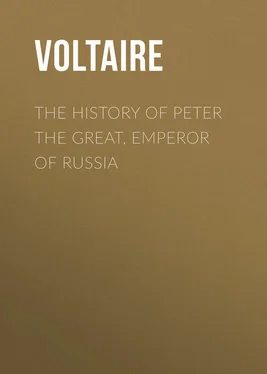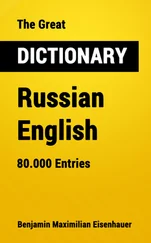Voltaire - The History of Peter the Great, Emperor of Russia
Здесь есть возможность читать онлайн «Voltaire - The History of Peter the Great, Emperor of Russia» — ознакомительный отрывок электронной книги совершенно бесплатно, а после прочтения отрывка купить полную версию. В некоторых случаях можно слушать аудио, скачать через торрент в формате fb2 и присутствует краткое содержание. Жанр: История, literature_18, foreign_prose, на английском языке. Описание произведения, (предисловие) а так же отзывы посетителей доступны на портале библиотеки ЛибКат.
- Название:The History of Peter the Great, Emperor of Russia
- Автор:
- Жанр:
- Год:неизвестен
- ISBN:нет данных
- Рейтинг книги:3 / 5. Голосов: 1
-
Избранное:Добавить в избранное
- Отзывы:
-
Ваша оценка:
- 60
- 1
- 2
- 3
- 4
- 5
The History of Peter the Great, Emperor of Russia: краткое содержание, описание и аннотация
Предлагаем к чтению аннотацию, описание, краткое содержание или предисловие (зависит от того, что написал сам автор книги «The History of Peter the Great, Emperor of Russia»). Если вы не нашли необходимую информацию о книге — напишите в комментариях, мы постараемся отыскать её.
The History of Peter the Great, Emperor of Russia — читать онлайн ознакомительный отрывок
Ниже представлен текст книги, разбитый по страницам. Система сохранения места последней прочитанной страницы, позволяет с удобством читать онлайн бесплатно книгу «The History of Peter the Great, Emperor of Russia», без необходимости каждый раз заново искать на чём Вы остановились. Поставьте закладку, и сможете в любой момент перейти на страницу, на которой закончили чтение.
Интервал:
Закладка:
To the south of the province of Smolensko, we meet with the province of Kiow, otherwise called the Lesser Russia, Red Russia, or the Ukraine, through which runs the Dnieper, called by the Greeks the Boristhenes. The difference of these two names, the one so harsh to pronounce, and the other so melodious, served to shew us, together with a hundred other like instances, the rudeness of all the ancient people of the North, in comparison with the graces of the Greek language. Kiow, the capital city, formerly Kisow, was built by the emperors of Constantinople, who made it a colony: here are still to be seen several Greek inscriptions upwards of twelve hundred years old. This is the only city of any antiquity in these countries, where men lived so long together without building walls. Here it was that the great dukes of Russia held their residence in the eleventh century, before the Tartars brought it under their subjection.
The inhabitants of the Ukraine, called Cossacks, are a mixture of the ancient Roxolanians, Sarmatians, and Tartars, blended together. Rome and Constantinople, though so long the mistress of other nations, are not to compare in fertility of country with the Ukraine. Nature has there exerted her utmost efforts for the service of mankind; but they have not seconded those efforts by industry, living only upon the spontaneous productions of an uncultivated, but fruitful soil, and the exercise of rapine. Though fond, to a degree of enthusiasm, of that most valuable of all blessings, liberty; yet they were always in subjection, either to the Poles or to the Turks, till the year 1654, when they threw themselves into the arms of Russia, but with some limitations. At length they were entirely subdued by Peter the Great.
Other nations are divided into cities and towns; this into ten regiments. At the head of which is a chief, who used to be elected by a majority of votes, and is called by the name of Hetman, or Itman. This captain of the nation was not invested with supreme power. At present the itman is a person nominated by the czar, from among the great lords of the court; and is, in fact, no more that the governor of the province, like governors of the pays d'etats in France, that have retained some privileges.
At first the inhabitants of this country were all either Pagans or Mahometans; but, when they entered into the service of Poland, they were baptized Christians of the Roman communion; and now, that they are in the service of Russia, they belong to the Greek church.
Amongst these are comprehended the Zaporavian Cossacks, who are much the same as our Bucaniers, or freebooters, living upon rapine. They are distinguished from all other people, by never admitting women to live among them; as the Amazons are said never to have admitted any man. The women, whom they make use of for propagation, live upon other islands on the river; they have no marriages amongst them, nor any domestic economy; they inroll the male children in their militia, and leave the girls to the care of their mothers. A brother has frequently children by his sister, and a father by his daughter. They know no other laws than customs, introduced by necessity: however, they make use of some prayers from the Greek ritual. Fort St. Elizabeth has been lately built on the Boristhenes, to keep them in awe. They serve as irregulars in the Russian armies, and hapless is the fate of those who fall into their hands.
To the north-east of the province of Kiow, between the Boristhenes and the Tanais, or Don, is the government of Belgorod, which is as large as that of Kiow. This is one of the most fruitful provinces of Russia, and furnishes Poland with a prodigious number of that large cattle known by the name of Ukraine oxen. These two provinces are secured from the incursions of the petty Tartar tribes, by lines extending from the Boristhenes to the Tanais, and well furnished with forts and redoubts.
Farther northward we cross the Tanais, and come into the government of Worownitz, or Veronise, which extends as far as the banks of the Palus Mæotis. In the neighbourhood of the capital of this province, which is called, by the Russians, Woronestch, at the mouth of the river of the same name, which falls into the Don, Peter the Great built his first fleet; an undertaking which was at that time entirely new to the inhabitants of these vast dominions. From thence we come to the government of Nischgorod, abounding with grain, and is watered by the river Wolga.
From the latter province we proceed southward to the kingdom of Astracan. This country reaches from forty-three and a half degrees north latitude (in a most delightful climate) to near fifty, including about as many degrees of longitude as of latitude. It is bounded on one side by the Caspian Sea, and on the other by the mountains of Circassia, projecting beyond the Caspian, along mount Caucasus. It is watered by the great river Wolga, the Jaick, and several other lesser streams, between which, according to Mr. Perry, the English engineer, canals might be cut, that would serve as reservoirs to receive the overflowing of the waters; and by that means answer the same purposes as the canals of the Nile, and make the soil more fruitful: but to the right and left of the Wolga and Jaick, this fine country was inhabited, or rather infested, by Tartars, who never apply themselves to agriculture, but have always lived as strangers and sojourners upon the face of the earth.
The above named engineer, Perry, who was employed by Peter the Great in these parts, found a vast track of land covered with pasture, leguminous plants, cherry and almond trees, and large flocks of wild sheep, who fed in these solitary places, and whose flesh was excellent. The inhabitants of these countries must be conquered and civilized, in order to second the efforts of nature, who has been forced in the climate of Petersburg.
The kingdom of Astracan is a part of the ancient Capshak, conquered by Gengis-Khan, and afterwards by Tamerlane, whose dominion extended as far as Moscow. The czar, John Basilides, grandson of John Basilowitz, and the greatest conqueror of all the Russian princes, delivered his country from the Tartarian yoke, in the sixteenth century, and added the kingdom of Astracan to his other conquests, in 1554.
Astracan is the boundary of Asia and Europe, and is so situated as to be able to carry on a trade with both; as merchandizes may be conveyed from the Caspian Sea, up to this town, by means of the Wolga. This was one of the grand schemes of Peter the Great, and has been partly carried into execution. An entire suburb of Astracan is inhabited by Indians.
To the south-east of the kingdom of Astracan, is a small country, newly planted, called Oremburg. The town of this name was built in the year 1734, on the banks of the river Jaick. This province is thick covered with hills, that are parts of Mount Caucasus. The passes in these mountains, and of the rivers that run down from them, are defended by forts raised at equal distances. In this region, formerly uninhabited, the Persians come at present, to hide from the rapacity of robbers, such of their effects as have escaped the fury of the civil wars. The city of Oremburg is become the asylum of the Persians and their riches, and is grown considerable by their calamities. The natives of Great Bukari come hither to trade, so that it is become the mart of Asia.
Beyond the Wolga and Jaick, towards the north, lies the kingdom of Casan, which, like that of Astracan, fell by partition to one of the sons of Gengis Khan, and afterwards to a son of Tamerlane, and was at length conquered by John Basilides. It is still inhabited by a number of Mahometan Tartars. This vast country stretches as far as Siberia; it is allowed to have been formerly very flourishing and rich, and still retains some part of its pristine opulence. A province of this kingdom, called Great Permia, and since Solikam, was the staple for the merchandizes of Persia, and the furs of Tartary. There has been found in Permia a great quantity of the coin of the first Caliphs, and some Tartarian idols, made of gold; 9 9 Memoirs of Strahlemberg, confirmed by those sent me from Russia.
but these monuments of ancient opulence were found in the midst of barren deserts and extreme poverty, where there were not the least traces of commerce: revolutions of this nature may easily happen to a barren country, seeing they are so soon brought about in the most fruitful provinces.
Интервал:
Закладка:
Похожие книги на «The History of Peter the Great, Emperor of Russia»
Представляем Вашему вниманию похожие книги на «The History of Peter the Great, Emperor of Russia» списком для выбора. Мы отобрали схожую по названию и смыслу литературу в надежде предоставить читателям больше вариантов отыскать новые, интересные, ещё непрочитанные произведения.
Обсуждение, отзывы о книге «The History of Peter the Great, Emperor of Russia» и просто собственные мнения читателей. Оставьте ваши комментарии, напишите, что Вы думаете о произведении, его смысле или главных героях. Укажите что конкретно понравилось, а что нет, и почему Вы так считаете.












